On Englishness, identity and patriotism (of the humble variety).
From conversations with Journalist & author of The Biography of Keir Starmer, Tom Baldwin, Political strategist & academic, Marc Stears and the writer Clover Stroud.
I have thought a lot in recent years about patriotism. About how it’s connotations seem to have changed and how it has morphed into something less palatable and fun that it once was, and that, I hope and am sure it can be once more. I love supporting England in the football and in other sports, I love seeing crowds from all across Britain line the streets for Royal occasions. I passionately love the British countryside with its wild flower meadows, rivers and rolling hills. I love the seasons and the strong sense of community I find in every place I ever live: cafes that become like home, friendly shopkeepers, the patience and bemusement of the man at the garage. There’s such a long list of things I love, but no time to list them here! Lately though, the notion of national pride has become something that all too often feels unsettling, uncomfortable, divisive and exceptionalist. I see a St George’s flag hanging in a window or outside a home and get a sense of unease. Quite the opposite from the joy I feel cheering on Southgate’s squad or the love for this country I get running over our green hills, along country lanes and canal paths and in so many smaller moments and characteristics: the gatherings, the humour, the unassuming village hall where I went to vote and stood with a line of locals chatting and laughing in the sunshine of a perfect English summer morning. Okay yes this part is hard to recall now as I sit shuddering with a hot water bottle, stubborning out the shorts through this cold rainy July. But that too is, well, wonderfully British. And next week will be a heatwave no doubt, and everyone will complain just as bitterly about that!
With this in mind I was really looking forward to my conversation with Tom and Marc about their new book England which sets out to answer what Englishness really is, what England is, and where do we go from here?
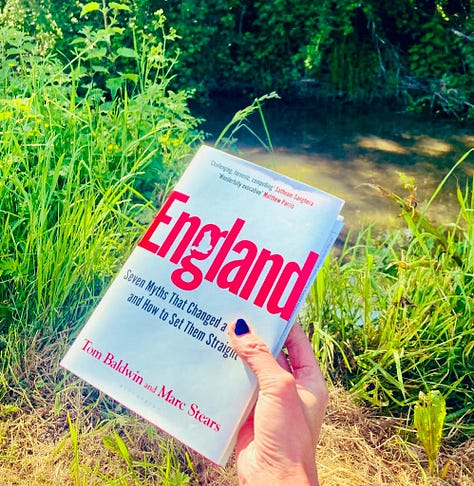
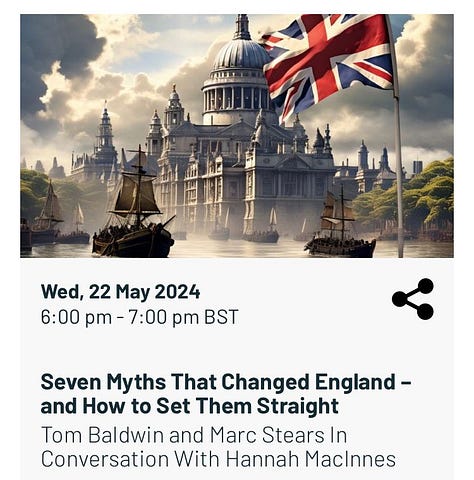
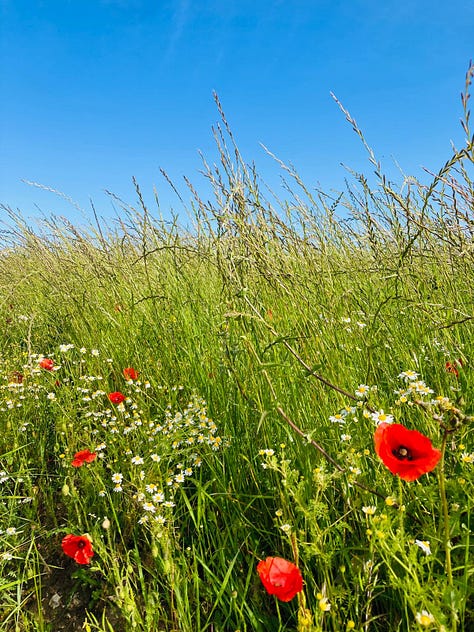
Then, with less than an hour to go before our online event, Rishi Sunak announced the General Election. Suddenly this theme, as well as the prospect of talking to a man who had written the official Biography of Keir Starmer became even more relevant.
What follows are my highlights from that conversation as well as the reflections of acclaimed and much loved writer Clover Stroud who I spoke to a few weeks afterwards about her new book The Giant on the Skyline which echoed and consolidated these ideas of what is is to love England and celebrate Englishness, not in a loud, bombastic manner but in a charming, humble and day to day way.
Here is the full video to watch (for free!) as I couldn’t quite fit all their infinite wisdom into the below. I do recommend it in its entirety
THE CONVERSATION
I started by asking how the book and its ideas would feed into the election and the campaigns, with a perhaps fiercer relevance than ever
TOM: There’s been a period where ideas of England have distorted our politics and got in the way of making sensible decisions. This idea of inventing liberty, which informed the Eurosceptics, the idea that we are a naturally seafaring race that once ruled the waves that informed the idea of Global Britain, the idea of us being an enchanted Island that needs only itself to survive that informs all the debates about immigration. I don’t think we can move forward as a country until we clear the way out of these over inflated myths.
Rishi perhaps wanted to test the centre ground of competence and decency and integrity but has been dragged away from that by his own party and that’s where a lot of what we write about in this book can be located: these Marshy myths of exceptionalism which I don’t think are what the English people look like. I don’t think it’s how most people think about themselves, but it has really really infected our politics.
(you won’t hear from Marc for a bit by the way, his line dropped and he had a little trouble getting back with us!)
Countries need stories … but what this country is is a muddle and we should not only recognise that muddle and embrace it but use the muddle to start solving our problems
Can these myths all be traced back to those on the Right of Politics?
No, we have a whole chapter on the myth of modernity, of New Labour and Thatcher maybe part of it too. The idea that we can bypass our past as a country and start anew. I don’t think that works either. Our argument is not to get rid of the stories that bind a country together, countries need stories, it’s about trying to bring them back down to size, to the size of people. Rooting them in real life. It applies to both left and right but one of the problems the conservative party has got is that it’s being carried away by these myths.
There are left wing myths as well about England. Some think there's a red line of continuity from the Magna Carta through the Chartists to the Toll Puddle Martyrs to the Suffragettes to the foundation of the NHS to Billy Brag. I don’t think this works either. There’s no one size fits all version of our country and politicians who try and impose one, whether from the Left or Right or Centre, are making a mistake. What this country is is a muddle and we should not only recognise that muddle and embrace it but use the muddle to start solving our problems because if the problems are complicated be sure as hell that the solutions are going to be complicated too.
Patriotic is not necessarily describing ourselves as better or best, or that we’ve got something we should impose on everyone else. Nor is it about inventing or exaggerating stories about our past and using them as guides to our future.
You know of course the accusation that will be levelled against you is that you are talking England down and being unpatriotic!
Both of us would describe ourselves as patriots, but patriotic is not necessarily describing ourselves as better or best or that we’ve got something we should impose on everyone else. That’s a sort of nationalism. Nor is it about inventing or exaggerating stories about our past and using them as guides to our future. Real patriotism, well I think we can look to my Keir Starmer book for this. He did a speech for St George’s Day, quite unusual for a Labour leader to embrace St George’s Day, and the stories he told about why he’s patriotic were very ordinary. They were about walking to the top of Scafell Pike with his disabled mother, going to a Football match and singing Three Lions, meeting ordinary people in towns. That felt to me an inclusive version of patriotism, of who we are as a country, one that fits into the folds of it much better than some of the people who have tried to run this country recently.
There’s a real beauty in the muddle that is Englishness. There’s something organic and creative in it which we should all be harnessing.
It feels that it has become more uneasy in recent times to be someone who says they love this country, to put out the bunting at a street party etc because it has become so enmeshed with ideas of nationalism and exceptionalism. Can it be wrestled back?
I had a friend who gave up walking in the countryside after Brexit as he associated the English countryside with pastoral idea of an England which had taken us out of the EU! A friend of Marc’s avoids parts of town where they have bunting and flags up at Royal Weddings. There is a danger for people on the left, that if you disdain something long enough you leave it to others to write those stories.
There’s a real beauty in the muddle that is Englishness, there’s something organic and creative in it which we should all be harnessing. So there are dangers for the left in ignoring patriotism and there are dangers from the right in claiming they’re the only ones who can be patriotic.
Explain why England is not even a country in an official sense?
Unlike Scotland, Wales and Northern Ireland, it doesn’t have its own government, it doesn’t have its own borders, there’s no English passport. For a long time the only identity we had was through the sports we invented (and mostly lost at). England has never really needed it’s own political identity because it’s been so dominant across the UK. People talk about England's inner Empire: Scotland, Wales and Ireland. In the absence of a formal legal political identity, what you have had is mythological political identity. The Pollster Rob Ford points out that those who regard themselves as English rather than British were more likely to vote for Brexit and more likely to have hostile views about immigration. So English identity became associated with one form of politics, which is obviously nonsense because I am as English as anybody. We are trying to carve out a version of England everyone can be part of, and no one in particular.
There are lots of different ways to be English and that’s the beauty of it.
What does ‘being as English as anyone’ mean then?
It’s about being part of England. That could be someone who has arrived here very recently, could be someone who has been living here generations, it could be someone who flies the Flag of St George outside their house or someone who feels very embarrassed at singing the National anthem. It could be someone who loves fish and chips and thinks they are asserting the national identity by eating it or someone who’s a vegetarian. There are lots of different ways to be English and that’s the beauty of it. There isn’t one thing that defines Englishness and I think attempts to do so actually destroy the most special quality of England.
Would you have written this without Brexit which has done so much to make us interrogate this concept of Englishness and England?
In the lead up to Brexit and the years after it I have seen this politicisation of England which has been very dangerous, centred on ideas of Englishness. In particular this exceptionalism about freedom which means we reject the European idea of human rights even though we were influential in forming European bill of Human Rights. This idea we have nothing to learn from this sinister continent and that we need to bypass it if we are going to prosper again through new trading links with the old empire. These are myths from the past which have been distorted and I don’t think they are doing us much good.
One of your Seven Myths centres around Runnymede and the Magna Carta. Tell us more …
During Lockdown I went for a walk to Runnymede. A place where supposedly Liberty was invented, and saw new memorials sprouting up since 2015 when David Cameron started talking about the conception of English liberty and Daniel Hannan was writing books about English liberty and why it matters. It occurred to us that in those places you find a rootedness which does’t exist in the myth. We meet two women sheltering and I ask them if they are here because of Magna Carta and they look at me like I am mad and say we are just here to walk our dogs! The inflation of these myths has distorted who we are. Being bored on a Saturday afternoon at a National Trust property is a much greater freedom than blazing across the world that we invented liberty and we don’t need to listen to anyone else.
You convey this recurring theme that there is room for a humbler relationship between England and liberty, that claims neither parentage nor inheritance?
MARC (is BACK in the zoom!): Yes! it is about things being more ordinary, humble, every day hum drum, rather than inflated beyond all proportion and untethered from the real world.
There’s a much less angry and polarised way of thinking about our country, rooted in the everyday and the smallness of life. One that takes the aggressive polarising punch out of our lives, when we see things from the local, from the everyday, rather than from the grand and the abstract. This way takes the nastiness out of politics that we have seen for the last two decades
When we asked people from all backgrounds what they thoughts of England: Politicians from left and right, community activists, playwrights, poets and businessmen and women, when they describe the country it is the everyday, humble, ordinary stories they turn to. It’s very rarely about the big booming myths or flag moments but about experiences they had as kids growing up in their neighbourhoods or their own kids and their schools.
These things come to the fore at certain times in history don’t they. It is when a country is struggling with its identity, as we are now, that these myths emerge.
Marc: It’s an anxiety. People looking for something to cling on to to give them confidence again. So they go for big stories, a need to believe we invented liberty or ruled the waves or are more moral and there’s a tendency to do it in times of polarisation as well, when you are looking at your fellow country people as the enemy, you have to come up with a big booming story of England so as to prove the country is ‘mine not theirs.’
We write about Wolverhampton and the rise of Enoch Powell and see how his racist story about the purity and whiteness of England, and impossibility of integrating immigrants betrays both: it comes from anxiety about what England should be after WW2 and then feeds into nastiness of thinking, I need a big aggressive story on my side to put people in their place.
People want to know the truth about our history, to reflect on it, grapple with it, think about what its legacy is for the present and move forward without denying who we are and what we’ve done.
You write about Enoch, you question the “Cult of Wilberforce”, Plymouth and idea of us being a great Seafaring power. The message being that we don’t need these myths, that we can question our history and role as imperialists. Why is it important to interrogate history? Often the narrative is that if we question things like statues we are talking down our country…
Marc: We don’t want the us and them narrative. Take Statues. Some want to tear them down and throw them into the sea, others want to glorify them and memorialise them no matter how repugnant. But we did polling with 'More in Common and discovered the vast majority don’t want either of these. They want to know truth and confront the nasty realities about our history, but at the same time they don’t want to tear them all down and fight a different kind of culture war. People want to know the truth, reflect on it, grapple with it, think about what its legacy is for the present and move forward without denying who we are and what we’ve done.
TOM: There’s something else here. Take Plymouth. Yes there should be a story for Plymouth and England about our long maritime history, chequered but interesting, and there should also be a relationship with the wind and sea, these elemental forces which have have shaped our country. But the idea that the answer is to build more aircraft carriers and start carrying out exercises in the Indo-Pacific doesn’t seem pertinent to the challenges facing us now. Plymouth University turns out to be a world leader in developing green technology, particularly floating Wind Farms. These are ugly things, not glamorous or swash and buckle, but if we can harness the wind and the sea to meet a challenge facing us at present, about climate change, about energy independence, about security, that’s a way of using the stories of our past to be relevant to the future, rather than trying to revive a past that never existed.
MARC : We find the truer version of England in the arts and drama. We talked to James Graham, for example, writer of Dear England, and to Tony Shumacher who wrote ‘The Responder’ that shows you the gritty reality of Liverpool life, shot through with beauty and potential and people battling difficult circumstances in ordinary humble ways. The themes we were finding were not represented in mainstream politics but in the TV shows and plays, people writing and trying to get a picture of the country that they are comfortable with.
On Multiculturalism
TOM: (Talking about Wolverhampton) Take football which was so often a vehicle for the worst insularity and sectarianism. In the 70s and 80s Wolves fans were going to games with pillow cases on their heads to mimic the KKK. Now Wolves has Punjabi / Sikh sections and ethnic foods outside the grounds. This symbol of the whole city is now shared by the whole city. That’s not some limp multiculturalism. Wolves existed long before the phrase multiculturalism was invented. Wolves football club is the most vivid symbol of the city and it’s shared by everyone. That’s the answer to Enoch Powell’s direst predictions in the late 1960s.
A lot of the things that have improved in recent years have been about learning from others. Our food is better because we have curries, pasta coffee, our cultural tastes have improved. Our football, a sport we invented, has improved with foreign players and coaches. In reality we are much more porous to other influences than the mythological version of our country that we don’t need to learn from anyone else but England. Britain always has, successful countries do.
MARC. When I returned to England after living in Australia with my then seven year old daughter who had never lived here I admit I was nervous when she started school in Hackney full of people from all over the world, different religions and ways of life. But she came back from the first day so full of energy, creativity, passion and love. Because in this community, while full of difference complexity and nuance, everyone got on with each other and felt there was some kind of common endeavour. That for me is the microcosm of the very best of England. If we can tell ourselves stories about that achievement and not stories that divide us and make us angry we will be much the better for it.
TOM: The real beauty of England is in the way our road system bends round hillsides rather than go through the middle, the way our laws adapt. I think that adaptation and ability to include lots of different people is the thing I love most about this country.
In the book even Nigel Farage surprises you?!
TOM: Yes we interview him and even he has more ambiguity than we give him credit for. If you scratch the surface of all these people there’s probably more we have in common. These straight lines and big polarising issues are ramped up by the media. I don't think that’s how people think, even the people who seem to be playing that game the hardest.
MARC: Being English is best found in Orwell’s ;Lion and Unicorn’ which describes the everyday aspects of our lives. Yes it was different in the 1940s of course, but for me it’s watching Gladiator or Dr Who with my 9 year old daughter on a Saturday night, grabbing coffee on way into work, picking her up from school and chatting to parents at the gates or getting the bus home after night out with friends. It’s the smells and textures and flavours we associate with the neighbourhoods in which we live. That has always been best of England and our great art and literature captures that. We forget that if we wrap ourselves in flags or tell ourselves grandiose stories. When I was a kid I’d get back after holiday and at first I would think oh it’s grey and gloomy here but then I think. But this is home.
Well What a place to bring in my chat with the writer Clover Stroud who writes all about home and belonging in her beautiful memoir The Giant on The Skyline. For her it’s a move away, to live in Washington, that makes her examine what it is she loves and cherishes most about a sense of place: her four walls, her community and the country she calls home.

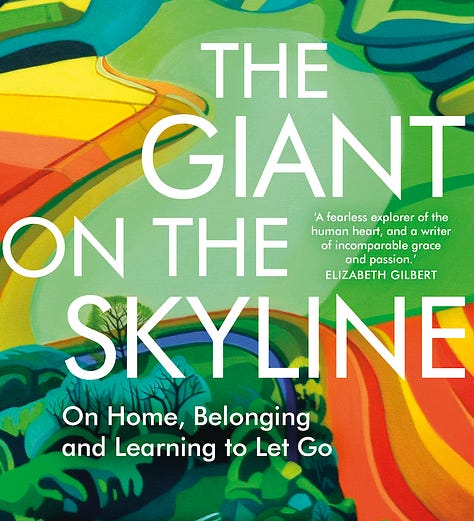
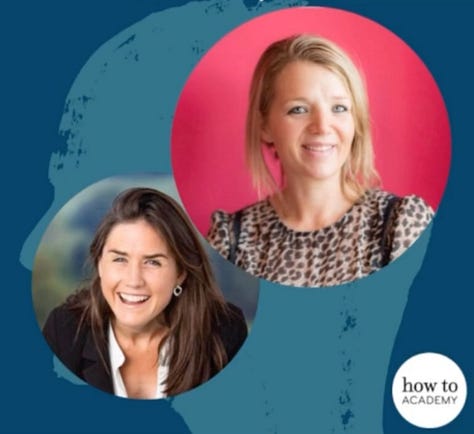
You can listen to our whole chat, which ranges far wider, here, but this is what she had to say about England. I loved how, without having yet read Tom and Marc’s book, her reflections are so uncannily similar to theirs.
Englishness is the talk in the village hall, the small incidental parts of life .. it’s about communication and creativity and those two things coming together in a small scale but profound way, which as a human being changes your day, and your day is your life.
CLOVER: It’s been a real privilege being able to view England from a distance. And coming back each time is exhilarating. Being able to understand things about English culture I might not have appreciated before.
I know there are many intense problems facing the country but I do feel really passionate about our country and way humour and communication seem to be at heart of British Life. It’s about this way of inference and double entendre and emotional resonance to the way we are in a room as human beings with each other which is very different to here in DC.
I am not saying either is better or worse and in fact one of the things I love about here is the way success is celebrated. In the UK we want to undercut success and can be snide and sarcastic and have tall poppy syndrome. So it’s lovely seeing it celebrated. Here, if you are good at something, people want to promote you.
But there’s an emotional connection and sense of humour that feels profoundly important about Great Britain and which I miss. You really stop taking it for granted. I came back to visit Bath last week and thought: Wow! this is outstandingly beautiful: the architecture and sense of history is outrageously interesting. I had, and I have always wanted to resist this: a Richard Curtis ish feeling!
I get this ALL the time!
CLOVER: I feel wary when talking about it that I don't want to veer near the nasty associations and violent and dangerous divisive place it takes us. But I can’t come back and not love those interactions within local life. Things like ‘chat’, the way people talk to each other. People don’t hugely chat on streets in DC. I love walking into any shop in England: there's a lyricism to the way people talk to each other.
And the messy scruffiness of it. I didn’t like the idea of English eccentricity before but now I see it as a deeply creative country. And with a change of government I hope that there will be more investment in the arts because that’s a big part of our souls.
So yes Englishness is the talk in the village hall, the small incidental parts of life. And the big bombastic statements of Empire feel redundant now, thank goodness. For me it’s about communication and creativity and those two things coming together in a small scale but profound way, which as a human being changes your day, and your day is your life.
***
Well I hope you have enjoyed these reflections. Has it led you to think about what England, Englishness or being British might mean to you. Do get in touch if so. I’d love to hear!




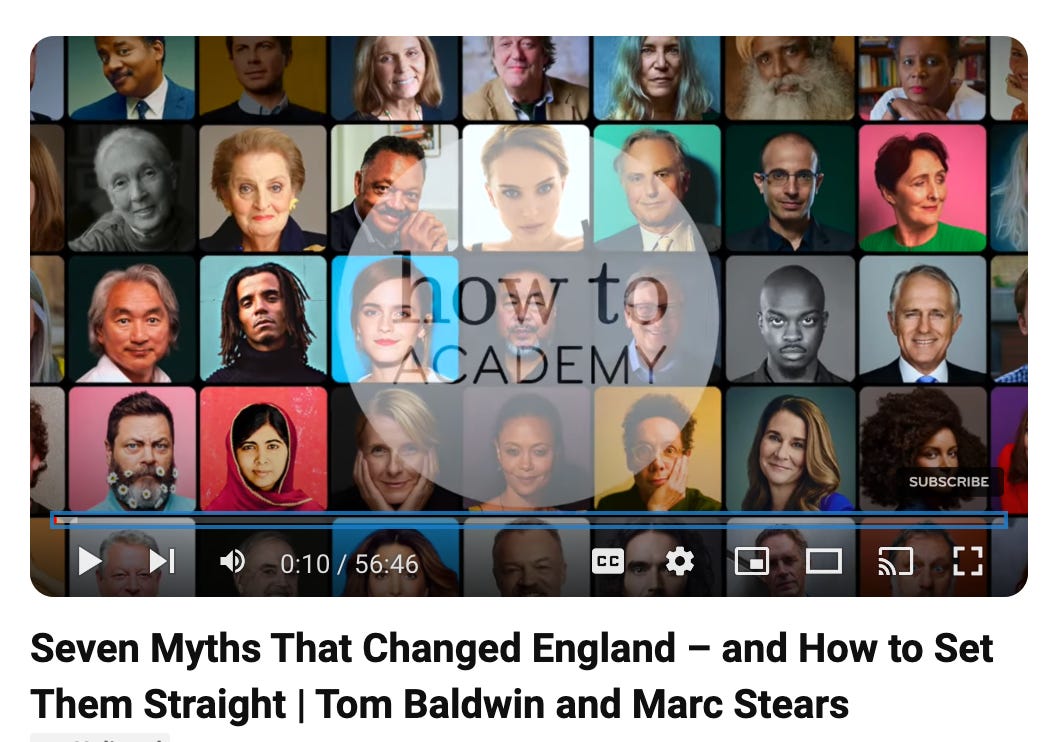
An interesting read! I've previously worked on this topic in a political context (advocating for a new Act of Union with a cross-party group of politicians) but I think the real crux of the issue is generational perception. Englishness can, at times, be too simplified. I've previously written about it for The Times: https://www.thetimes.com/uk/politics/article/the-union-is-doomed-unless-its-future-custodians-get-a-say-9clcbnwzj